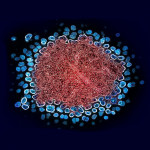People on antiretroviral (ARV) therapy with fully suppressed virus were more likely to see virus levels go up if they also reported physical symptoms—such as vomiting, or aches and pains—and psychological symptoms like anxiety and sadness, according to a study published online February 10 in the Journal of Acquired Immune Deficiency Syndromes.
A number of studies have found that people with psychological symptoms of depression and anxiety are more likely to have adherence problems and in turn to do less well on ARV therapy. Few researchers have explored, however, the potential link between psychological and physical symptoms and the loss of virological control in people who had achieved undetectable viral loads—and who presumably have not had significant adherence problems.
To explore this link, Fiona Lampe, PhD, from the University College London Medical School, and her colleagues compared reports of psychological and physical symptoms with records on viral load and CD4 count in 188 people living with HIV who had achieved a viral load less than 50 copies. All participants started the study with virus fully suppressed. Most of the participants were white men, and most had virus suppressed to less than 50 copies for at least one year. All were given a survey that asked questions about physical symptoms—such as pains and stomach problems—and psychological symptoms like anxiety, sadness and suicidal thoughts.
Of the 188 participants, 46 experienced a viral load rebound above 50 copies and 22 experienced a viral load rebound above 200 copies. Physical and psychological symptoms were also common. Twenty-five percent reported feeling sleepy and tired, 20 percent reported a lack of energy, 20 percent had a reduced sex drive, and 15 percent had diarrhea. Nearly half reported symptoms of depression and anxiety.
Lampe’s team found that the presence of physical and psychological symptoms had a significant association with the likelihood of viral rebound, and this link appeared to be independent of adherence. People with the greatest number of symptoms, in total, and who had symptoms that were more intense and more frequent were up to five times more likely to experience a virological rebound. People with psychological symptoms were almost four times as likely to have a rebound.
Although adherence was present in 8 percent of the people in the study, and was independently associated with virological rebound, the authors state that, “Non-adherence did not substantially explain the associations between symptoms and viral rebound.”
The authors acknowledge, however, that their sample size is small and that drug and alcohol use—about which they didn’t ask—could have influenced their results.
“Simple symptom inquiry conducted as part of routine clinical care may be valuable to identify patients at risk of future treatment failure,” they conclude, “and provide opportunity not only for assessing adherence but also for appropriate medical and psychological interventions to address physical symptoms and psychological distress.”
Advertisement
Advertisement
Advertisement






3 Comments
3 Comments